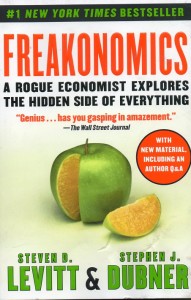Book Review: Freakonomics: A Rogue Economist Explores the Hidden Side of Everything by Steven D. Levitt & Stephen J. Dubner
Economics can be a deadly dull subject, at least when dominated by stuffed shirts talking about trade deficits, returns on annuities or fiat currency. But the basics of economic theory can be used to learn useful or amusing things about the world. With a large enough set of valid data, you can tease out fascinating conclusions, such as the answer to the question “is there cheating in professional sumo wrestling?” (Probably, or some really amazing and highly consistent coincidences.)
This book, as the front cover, back cover and several pages at the front remind us, was a New York Times bestseller and all-round phenomenon back in 2005. (I wonder if there’s some sort of data available on whether having eleven pages of praise for the book before you even get to the title page is a good investment; I skipped right over it.) It talks about such concepts as positive and negative incentives, regression analysis and information inequality as they relate to cheating schoolteachers, crime rates, baby names and other offbeat subjects.
Perhaps the most controversial subject covered is the notion that legalized abortion led to a massive drop in crime rates in the United States. The evidence seems sound, but as the authors remind us, the data only shows us what is there, not what should be there. The same results might have been achievable by other, less painful means.
There are some major changes to this edition of Freakonomics; the chapter with the story of how the Klu Klux Klan was beaten back had to be heavily revised when one of the sources was revealed to have been exaggerating his role. There are also several newspaper articles covering subjects that only got a passing mention in the main text, plus the one that got Mr. Dubner interested in covering Mr. Levitt’s research in the first place. The advertised “Author Q & A” is rather flippant, and more of an advertisement for their next book, Super Freakonomics.
As a semi-scholarly book, there are footnotes, and an index, as well as a list of baby names you might want to consider.
I found this an interesting book with some thought-provoking insights, though some of the conclusions seem a bit iffy. Recommended to just about everyone, but especially those who’d like to know more about the less stuffy side of economics.

